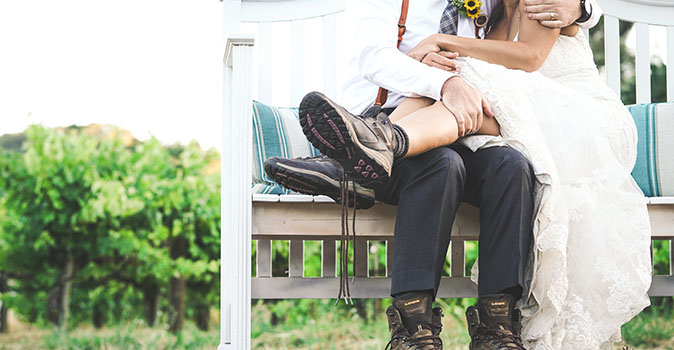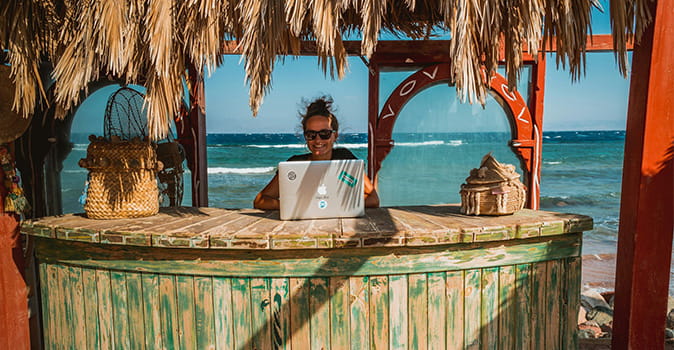Have you ever thought about ditching your 9 to 5 to explore the world with your partner? It's not as challenging as you may be imagining. In fact, you can find opportunities on almost every continent.
Working together while traveling can be a rewarding experience for you and your partner. Moreover, you're likely to save money on transportation and resources as you share a ride to work, or even receive living accommodations from your employer.
If you and your partner have decided to work and live abroad, this guide will help you make your dream a reality.
Below, you'll find the best traveling jobs for couples, broken down by category so you and your partner can choose your own adventure:
- Hospitality
- Teaching English as a Second Language
- Farming & Agriculture
- Adventure & Recreation
- Volunteering
Each category includes tips, top locations, and resources to help you score your dream job as a team.
Hospitality Traveling Jobs for Couples
Hospitality jobs are number one on our list of top jobs for couples abroad. That's because they don't require special skills or degrees, and they often come with room and board accommodations for couples. Whereas single travelers may need to bunk with a stranger, you can arrange a private room for you and your loved one.
International restaurants, hostels, and hotels are common businesses that offer opportunities for couples to work together.
Such jobs include:
- Hotel managers
- Innkeepers
- Kitchen and chef staff
- Host/hostess
- Customer service
- Bartenders
- Waitstaff
- Maintenance/janitorial services
Top Countries for Hospitality Jobs
You'll find the best hospitality jobs in countries whose economies are driven by tourism. Instead of being a common tourist, you'll get paid to visit some of the most sought-after vacation spots in the world.
In Europe, you'll find that Italy and Greece's top industry is tourism. That means plenty of job openings, especially during the summer. Tourism is also a major contributor to Iceland, Germany, and Spain's economies, making them highly desirable destinations for couples looking to work abroad.
Not feeling Europe? Mexico's sprawling beaches are speckled with high-end resorts that need your help, too. Learn Spanish while you and your partner spend mornings cooking and cleaning and afternoons exploring the countryside.
Discover how to get by in a foreign country when you don't speak the language.
Resources / Tips
If you already have experience working in restaurants or hotels, you're halfway there. If not, look for housekeeping jobs and night auditing. Most hospitality skills can be learned on the job.
Explore these websites to find the right fit for you:
- Working Couples
- Greenheart Travel
- List of Work Abroad Job Boards
- List of Countries Dependent on Tourism
Will Your Health Insurance Cover You and Your Partner as You Travel and Work Abroad?
Many health insurance plans no longer cover you once you leave your home country, and your new job may not provide any coverage—especially if you’ll be working part time or picking up gig work.
That’s where nomad health insurance comes in. Nomad insurance can provide up to 365 days of coverage for unexpected injury and illness, trip interruption, and more while you and your partner work and explore the world abroad.
The Atlas Nomads plan from WorldTrips is flexible to support your new nomadic lifestyle. Non-U.S. citizens and residents traveling and working away from their home country can pay up front or select a monthly payment option, and they can purchase their plan at any time—even after departure. Learn more about the benefits of Atlas Nomads here.
If you are U.S. citizens or residents planning to work abroad, consider Atlas Travel insurance instead.
Teach English as a Second Language Abroad
As recommended by the United Nations, English teaching programs are the most common jobs abroad for couples. These jobs are typically a one-year engagement where you teach English in exchange for pay and living expenses
And no, you don't need to speak the native tongue in order to teach English abroad. You'll find that many of these students already know a fair amount of English.
Top Countries for Teaching English Abroad
You'll find an abundance of job opportunities for teaching English as a second or foreign language in Asia and South America.
We recommend starting with Japan and China, as the demand for English teachers is high. However, the cost of living in these countries is high, so you'll want to look for a program that offers living accommodations or a stipend.
You'll find cheaper food and rent in Taiwan, Malaysia, and Thailand, as well as a change of pace from the hustle and bustle of Chinese and Japanese cities.
If you're interested in honing your Spanish skills, Colombia, Mexico, and Costa Rica offer a scenic escape with plenty of job opportunities for couples.
Resources / Tips
There are steps you can take to increase your chances of landing a teaching job with your partner.
For starters, you should both get TEFL-TESOL certified. (TEFL means "teaching English as a foreign language" and TESOL means "teaching English to speakers of other languages.") The certification is usually inexpensive and shows that you have the dedication and skills needed to succeed as a TEFL-TESOL teacher.
Discover the 6 steps you should take to get a teaching job abroad.
Having a bachelor's degree is also a great asset. If you're only a few credits away from completing it, do it.
We recommend you use an established exchange program. An exchange program will understand your needs (namely that you and your partner are looking for jobs as a couple). They'll be able to set you up with an opportunity that accommodates you.
Some helpful exchange programs include:
Looking for the ultimate in freedom? Thanks to advances in technology, you can also teach English as a second language online. Travel where you like with your partner while making decent money, all from your laptop.
Explore these TESOL online programs:
Farm Jobs for Couples
If you're not afraid of getting a little dirty, there are many opportunities for couples abroad in agricultural work. Farm and agricultural jobs commonly provide living accommodations for their workers, as you may be in a more rural part of the country.
You can find farming work in almost any field. From Italy's vineyards to sheep shearing in New Zealand, there's a hands-on job that's right for you and your partner.
Top Countries for Farming Jobs
Start by researching which countries' economies are most dependent on agriculture. This will help you find the most opportunity for landing a farming job, especially if you have little to no experience working on a farm.
For example, Ghana relies on agriculture, as it makes up 52% of its economy. Italy is the highest producer of organic vegetables in the EU, and New Zealand is the 8th largest milk producer in the world. Or go bananas supporting Ecuador's massive banana industry.
A little research will help you locate the right farm for you and your partner.
Resources / Tips
Many farming opportunities are volunteer based, so make sure you're asking the right questions regarding hourly pay and housing. Farm jobs for couples can also be demanding, so you'll want to inquire about the number of hours you're expected to work per day.
Other questions to ask include:
- What will our day-to-day responsibilities be?
- What qualities do you look for in your farm workers?
- Who will we be working with most closely?
- Will my partner and I be able to share accommodations?
- Will my partner and I be able to work similar schedules?
Explore agricultural jobs at the following sites:
- Go Abroad Agriculture
- Harvest Jobs in Australia
- Workaway (Membership fee: $44 for individual, $56 for couples)
- Fruit Picking Jobs
Adventure Travel Jobs for Couples
If you have any experience in the great outdoors, seeking new adventures in foreign lands is a no-brainer. Love the water? Look for jobs like teaching surfing on the beach or giving kayaking and canoeing lessons to campers on the world's greatest lakes.
If you and your partner are land lovers, you can find opportunities as tame as guiding day hikes for hotels or as exciting as leading rock climbing and mountaineering excursions. Whatever you've got to offer, there's a job for you and your partner.
In some cases, one partner might have more experience than the other. Don't be discouraged. Say you and your partner are hired by the same lodge. On slow days, you could both help with cleaning and guest services. When needed, the partner with more experience could lead a river rafting expedition. On off days, you could explore the country together.
If you approach potential jobs with a solid work ethic and an open mind, you'll likely find that lots of places are willing to work with you to accommodate your needs.
Top Countries for Adventure Jobs for Couples
The best adventure opportunities depend on your expertise. Let's break it down a little further.
Top Countries for the Mountains
If you're mountain-loving lovers, you'll find opportunities to lead backpacking trips in Canada, Mexico, Peru, Chile, Nepal, India, and parts of Africa. Check out the National Outdoor Leadership School (NOLS) to get a sense of where your legs and a backpack can take you.
Top Countries for Beach-Side Water Sports
Help vacationers learn the basics of ocean kayaking, surfing, and sport fishing in Hawaii, the Bahamas, Mexico, Spain, Greece, Italy, and South America.
Top Countries for River Sports
Cast a line as a fly-fishing guide, canoe guide, or kayak guide in Peru, Costa Rica, or Brazil.
Resources / Tips
There are many certifications you can get to increase your odds of landing an adventure job together. The better prepared you and your partner are, the more options you'll have for landing an exciting adventure job for the two of you.
For starters, invest in these safety certifications:
- Wilderness First Responder (WFR) Certification from NOLS
- Wilderness First Aid (WFA) Certification from NOLS
- CPR, First Aid, &; AED Certification from the American Red Cross
Depending on your adventure of choice, you'll find additional courses to certify you as an instructor. For example:
- AMGA Climbing Instructor Certification from the American Mountain Guides Association
- ACA Instructor Certification from the American Canoe Association
- Casting Instructor Certification from Fly Fishers International
If you can dream it, there's a certification course for it. The better prepared you and your partner are, the more likely you'll be able to land jobs abroad.
Pro Tip: Check If Your Health Insurance Covers You Abroad
Our last and perhaps most important tip for couples seeking adventure jobs abroad is to determine whether you need a travel health insurance plan like Atlas Nomads. Many travelers are surprised to learn their regular health insurance may not cover them outside their home country.
As you and your partner travel abroad for work and adventure, there’s the risk of incurring an unexpected injury or illness. A travel health insurance plan like Atlas Nomads can insure you and your partner for up to 365 days. It offers coverage for unexpected injury or illness, emergency medical evacuation, and can even provide reimbursement for the costs of replacing lost passports and travel documents.
Learn more about what travel medical insurance is and what it covers, discover why you may need it, or explore the benefits of Atlas Nomads insurance.
Volunteer Work for Couples
If you can afford it, volunteer opportunities are some of the most common jobs for abroad. In programs such as the Peace Corps, you may not get paid, but you will receive free room and board and student loan deferment. Another well-known volunteer position is an International Aid Worker who helps undeveloped countries.
If you're a couple that's really into green living, World Wide Opportunities on Organic Farms (WWOOF) offers great opportunities for couples who wish to do organic farm work around the world. WWOOFing jobs are typically volunteer oriented, but some do pay or offer room and board.
Countries for Volunteering Abroad
Finding volunteer work for couples is far easier than finding paid work. When choosing a country to volunteer in, consider the cause and the climate. These are perhaps the two biggest factors for finding a job that will help you feel content and fulfilled.
For example, if you and your partner dream of helping build sustainability by volunteering to work on an organic farm, make sure the location you choose has a climate you both find tolerable. Consider New Zealand, Ireland, or Costa Rica for their mostly temperate climates.
Find Your Dream Job for Couples Abroad
No matter where you choose to live abroad, make sure you research your options, obtain or update passports, and brush up on the country's culture to familiarize yourself with your destination. Knowing what to expect when it comes to everything from the country's laws and legal system to the weather can help ensure you and your partner have a smooth and easy transition abroad.
While there is adventure and risk involved, jobs for couples abroad offer the possibility of life-long enjoyment and rewards. Take the time to carefully consider what such a move will mean to you. When you're ready to start planning your trip, download "The Ultimate Guide to Budget Travel" to explore tips and advice from full-time travel pros.




